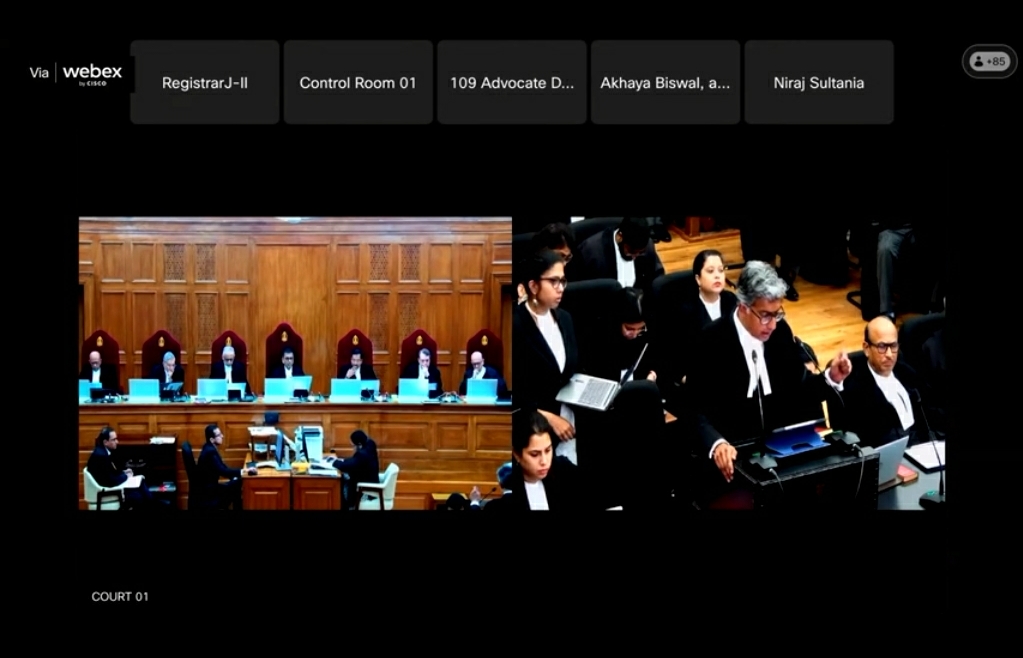
On livestream, India Supreme Court seven-judge bench revisits a 1998 verdict
By Staff Writer.
India Supreme Court seven judge bench revisited a 1998 verdict of the same court last Wednesday and Thursday. This is the first time after six years a seven judge bench was constituted.
It was also the first time in the history of the Indian Supreme Court that a seven-judge bench hearing was live-streamed. Indian Supreme Court’s Constitution Bench hearings are usually live streamed and available online.
The 1998 verdict granted immunity to legislators (MPs and MLAs) from prosecution for accepting bribes to make a speech or vote in Parliament and state legislatures.
1998 PV Narasimha Rao judgment
According to IndiaToday, A five-judge Constitution Bench had, in 1998, granted immunity to 10 MPs belonging to Jharkhand Mukti Morcha (JMM) and Janta Dal from prosecution for taking bribes to vote in favour of the PV Narasimha Rao’s Government in a no-confidence motion.
“However, in 2007, another bench of the Supreme Court ruled in Raja Rampal’s case that those who took money to ask questions in Parliament were liable to be expelled from the House permanently. To bring clarity, a five-judge constitution bench headed by CJI Chandrachud referred the case to a seven-judge bench.”
The instant case “pertains to Sita Soren, who was an MLA in the Jharkhand Assembly and was being prosecuted by the CBI for allegedly taking bribes for voting in the 2012 Rajya Sabha Poll. She had been accused of receiving bribes from a Rajya Sabha candidate for casting her vote in his favour, but instead she voted for another candidate.
“Her father-in-law and JMM leader Shibu Soren was saved by the 1998 Constitution Bench verdict wherein the top court ruled that MPs who took money and voted in favour of Rao’s government were immune from prosecution. However, it ruled that those who gave the bribe to JMM MPs were not immune from prosecution.
“Petitioner Sita Soren has claimed protection under Article 194(2), which is identical to Article 105(2) that states, “No member of Parliament shall be liable to any proceedings in any court in respect of anything said or any vote given by him in Parliament or any committee thereof, and no person shall be so liable in respect of the publication by or under the authority of either House of Parliament of any report, paper, votes or proceedings.”
The recorded video of the proceedings of the hearing in the Supreme Court on October 04 is below:
The recorded video of the proceedings of the hearing in the Supreme Court on October 05 is below:
Why is livestreaming of court proceedings necessary?
On September 27, 2022 Indian Supreme Court enabled the live streaming of the hearing of cases. IndianExpress has reported that the Court’s original decision of September 27, 2018, allowing the live telecast of important proceedings paved the way for this outcome. The bench of the then Chief Justice Dipak Misra, Justice A M Khanwilkar and Justice D Y Chandrachud had held that the live-streaming of court proceedings is in the public interest. The telecast, they pointed out, would enliven judicial labour for the public at large to strengthen constitutional values, democracy, and citizenship.
On September 20, last year, a full court of all Supreme Court judges under the leadership of Chief Justice U U Lalit took the unanimous decision to live-stream constitutional bench proceedings. The Chairperson of the Supreme Court’s E-committee and the driving force behind the live streaming initiative was the present Chief Justice Chandrachud, who began the hearing in his courtroom by announcing, “We are virtual”.
IndianExpress states, “[t]he Indian Supreme Court has done, in letter and spirit, what the former Master of the Rolls of the Court of Appeals Lord Denning had said many decades ago: ‘If we never do anything which has not been done before, we shall never get anywhere. The law will stand still while the rest of the world goes on, and that will be bad for both.’

